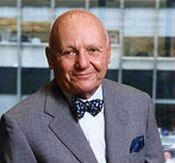
OBITUARIO
Alan Courtney Greenberg

Alan C. Greenberg, a risk-chasing Wall Street titan who built Bear Stearns into a global investment banking powerhouse, died on Friday in Manhattan. He was 86. The cause was complications of cancer. Mr. Greenberg's nickname was "Ace," and he kept a deck of cards on his desk, ready to deal. He was a champion bridge player, a magician who conjured coins with sleight of hand, a show-off who could whiz-bang a yo-yo, an adventurer who played pool with sharks and stalked game in Africa. He was a cigar-chomping capitalist in shirt sleeves: balding, muscular, poker-faced — some said icy — and he enforced strict regimens among employees: no loafing or small talk, no big salaries but commissions based on performance, and no long meetings. Mr. Greenberg loved the trading room, with its maelstrom of shouts, jangling phones, desks overflowing with paper and high-speed transaction displays. In his office he kept a photo of himself crouching over an African antelope he had slain with bow and arrow. That buccaneer spirit propelled him over five decades from Bear Stearns's stock room, where he began as a clerk in 1949, to trading floors, where he mastered moneymaking skills, and into the executive suite, where he became chief executive in 1978, chairman in 1985 and chairman of the executive committee in 2001. Alan Courtney Greenberg was born in Oklahoma City on Sept. 3, 1927, one of three children of Theodore and Esther Greenberg. His father ran a clothing store, part of a family retail chain. He attended the University of Oklahoma on a football scholarship, but after a back injury transferred to the University of Missouri and graduated in 1949 with a bachelor's degree. He moved to New York, determined to make good on Wall Street. Lacking an Ivy League degree, he was rejected by five white-shoe firms. But Bear Stearns, open to aggressive novices regardless of background, made him a $32.50-a-week clerk. He lobbied for promotions and soon demonstrated remarkable trading skills. By 1958 he was a full partner, one of the storied clerks who became millionaires at Bear Stearns. Mr. Greenberg and his first wife, Ann — the marriage ended in divorce in 1976 — had two children, Ted and Lynne Koeppel, who survive him. He is also survived by his second wife, the former Kathryn Olson; a sister, DiAnne Hirsch; a brother, Maynard; and five grandchildren. A bout with colon cancer magnified Mr. Greenberg's risk-taking, colleagues said. He made a market in New York City bonds during the city's financial crisis in the 1970s, traded in troubled securities others shunned, sold stocks at the first sign of a price downturn, and bought in large blocks so that small price gains made big profits. His dictum was unswerving: Incur no inordinate losses. Subordinates who did were soon gone. In 1985, Bear Stearns became one of the first brokerages to go public, a move he opposed because it meant more rules restricting traders. But it brought in a fortune, and the firm expanded its network of offices nationally and around the world. Mr. Greenberg also enhanced the firm's sharp-elbowed culture by hiring what he called people with PSD degrees — non-M.B.A.'s who were poor, smart and desirous of riches. One was Mr. Cayne, a world-class bridge player and former bond salesman whom he hired in 1969. Mr. Greenberg, with Mr. Cayne and James Jacoby, won the prestigious Reisinger national bridge championship in 1977. He often played bridge with Laurence A. Tisch, the chief of CBS; Milton Petrie, of Petrie Stores, and sometimes the investor Warren E. Buffett and the publisher Malcolm Forbes. Mr. Greenberg gave millions to charities, including the United Jewish Appeal. In 1998, he gave $1 million to the Hospital for Special Surgery in Manhattan to provide Viagra to men who could not afford it, and when Bear Stearns failed he pledged $360,000 to 25 low-paid employees who lost their jobs — $200 a month each for six years.Besides his memoir, Mr. Greenberg wrote "Memos From the Chairman" (1996), a collection of his good-natured, idiosyncratic notes to employees, including admonitions to conserve electricity, promptly answer calls from the boss and never throw away paper clips. "The time to stop stupidity and be tough on costs is when times are good," he wrote. "Any schlemiel and most schlamozels try to cut costs when times are bad." (A schlemiel is the guy who spills his soup at the big wedding; a schlamozel is the guy he spills it on.) A Graveside Service will be held on Friday, August 1, 2014, at 10 a.m. at Temple B'Nai Israel Cemetery located at Memorial and Kelly, Oklahoma City. Arrangements under the direction of Hahn-Cook/Street & Draper Funeral Directors, Oklahoma City, OK.
Muestre su apoyo
Comparta Un Recuerdo
Comparta
Un Obituario
Obtenga actualizaciones
Servicios
COMPARTA UN OBITUARIO
- RECIBIR RECORDATORIOS
v.1.9.5